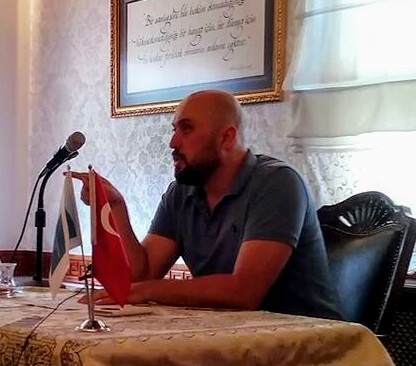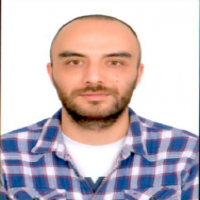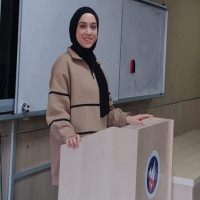Issue Editorial Board


Issue Reviewers

 0000-0001-6296-8568
0000-0001-6296-8568






Aim & Scope
“Journal of Social and Cultural Studies” (J-SCS) is an interdisciplinary academic journal aiming to provide an international basis for original works in social sciences and humanities. The main purpose of the journal is to give opportunities for publication of high-quality interdisciplinary studies and to present them as open access to researchers.
Sciences
• Sociology
• Social Work
• Philosophy
• History
• Turkish Language and Literature
• Arabic Language and Literature
• Western Languages and Literatures
• Religious Studies
• Islamic History and Arts
• Economics
• Political Science
• Administrative Science
Author Guidelines
Articles that do not fully comply with the stylesheet, the ethical rules and the publication principles will not be evaluated. Please read the "Ethical Rules and Publication Principles " menu before checking stylesheet.
Rules updated: Januray 1st, 2021
Submission: https://dergipark.org.tr/en/pub/jscs.
"Conlict statement" should also be filled in, signed and uploaded during submission.
Turnitin /iThenticate report must also be uploaded to the Dergipark system. The author's name and information should not be included in the similarity report to be uploaded during the application! To get support on this issue, please send an e-mail to editor@toplumvekultur.com.
Articles accepted after the date of November 12th, 2020 are assigned a doi number.
All submissions to be considered for publication should be written in Turkish or English. If the article is written in Turkish, it should include Turkish and English abstracts; if written in English, it should include English and Turkish abstracts. In addition, upon request, pro-bono support will be provided for the author's Turkish translation of the abstract.
All texts should be uploaded in .doc or .docx format after being overwritten on the "Sheet" which is seen as a link above.
It should be noted that the work submitted to this journal has not been previously published or is not under consideration for publication elsewhere.
The margins should be set at 2.5 cm top and bottom, left and right on A4 paper. The spacings in paragraph settings of main body text should be as written below.
The main body text spaceline:1,5, Spacing before:6 nk, Spacing after: 6nk; Abstract text space line:1, Spacing before:6 pt, Spacing after: 6pt
Font of the text should be "Garamond". The main body and Abstract text should be 12 pt type. For quotations longer than 3 lines or 40 words, start the quotation on a new line, with the entire quote indented 1 cm from the left and right margin, use 11 pt type and 1-spaced paragraph for the text. Italic text type is not allowed for the abstract and the quotations.
Use bold for the title of the article and section headings only. One line blank should be left before each subtitle.
Notes and explanations must be inserted as footnotes.
The name, surname, e-mail address, ORCID number of the author should be specified as footnote on the first page.
The text must be justified, the main title should be centered and subheadings should be left-justified.
Subtitles should be like the sample below:
Intoduction
1.Küreselleşme ve Göç
1.1. Göçmen Ağları
1.2. Sosyal Sermaye ve Göç
1.2.1. Aktarılamayan Sosyal Sermaye Biçimleri
Türkiye'ye Zorunlu Göçler
2.1. Önder Mahallesi'nde Suriyeliler
Results
The papers should not be less than 3,500 words, nor should they exceed 9,000 words. The abstract in article language should not be less than 200 words, nor should it exceed 300 words.
All submissions should conform to the requirements of the Publication Manual of the American Psychological
Association (6th ed.). Further information can be obtained from the American Psychological Association’s style website: https://apastyle.apa.org/style-grammar-guidelines/references
References in the article should be as in these examples:
Bourdieu (2014) in a paper on ... [commonest version];
Wagner (2001, pp.81-82) states that ... or Wagner (2001: pp.81-82) state that [where the page number is required];
----------- (Berger, 2011: p.38). or ----------- (Berger, 2011, p.38).
Note: The only exception to the absence of page numbers in in-text citations is references to the whole work or its main idea.
For references and citation examples, see:
Samples from web page: https://apastyle.apa.org/style-grammar-guidelines/references
Whole authored book
Jackson, L. M. (2019). The psychology of prejudice: From attitudes to social action (2nd ed.). American Psychological Association. https://doi.org/10.1037/0000168-000
Sapolsky, R. M. (2017). Behave: The biology of humans at our best and worst. Penguin Books.
Parenthetical citations: (Jackson, 2019; Sapolsky, 2017)
Narrative citations: Jackson (2019) and Sapolsky (2017)
Whole edited book
Kesharwani, P. (Ed.). (2020). Nanotechnology based approaches for tuberculosis treatment. Academic Press.
Torino, G. C., Rivera, D. P., Capodilupo, C. M., Nadal, K. L., & Sue, D. W. (Eds.). (2019). Microaggression theory: Influence and implications. John Wiley & Sons. https://doi.org/10.1002/9781119466642
Parenthetical citations: (Kesharwani, 2020; Torino et al., 2019)
Narrative citations: Kesharwani (2020) and Torino et al. (2019)
Harris, K. R., Graham, S., & Urdan T. (Eds.). (2012). APA educational psychology handbook (Vols. 1–3). American Psychological Association.
Parenthetical citation: (Harris et al., 2012)
Narrative citation: Harris et al. (2012)
Chapter in an edited book
Aron, L., Botella, M., & Lubart, T. (2019). Culinary arts: Talent and their development. In R. F. Subotnik, P. Olszewski-Kubilius, & F. C. Worrell (Eds.), The psychology of high performance: Developing human potential into domain-specific talent (pp. 345–359). American Psychological Association. https://doi.org/10.1037/0000120-016
Dillard, J. P. (2020). Currents in the study of persuasion. In M. B. Oliver, A. A. Raney, & J. Bryant (Eds.), Media effects: Advances in theory and research (4th ed., pp. 115–129). Routledge.
Parenthetical citations: (Aron et al., 2019; Dillard, 2020)
Narrative citations: Aron et al. (2019) and Dillard (2020)
Journal article
Grady, J. S., Her, M., Moreno, G., Perez, C., & Yelinek, J. (2019). Emotions in storybooks: A comparison of storybooks that represent ethnic and racial groups in the United States. Psychology of Popular Media Culture, 8(3), 207–217. https://doi.org/10.1037/ppm0000185
Parenthetical citation: (Grady et al., 2019)
Narrative citation: Grady et al. (2019)
Jerrentrup, A., Mueller, T., Glowalla, U., Herder, M., Henrichs, N., Neubauer, A., & Schaefer, J. R. (2018). Teaching medicine with the help of “Dr. House.” PLoS ONE, 13(3), Article e0193972. https://doi.org/10.1371/journal.pone.0193972
Parenthetical citation: (Jerrentrup et al., 2018)
Narrative citation: Jerrentrup et al. (2018)
Newspaper Article References
This page contains reference examples for newspaper articles.
Carey, B. (2019, March 22). Can we get better at forgetting? The New York Times. https://www.nytimes.com/2019/03/22/health/memory-forgetting-psychology.html
Harlan, C. (2013, April 2). North Korea vows to restart shuttered nuclear reactor that can make bomb-grade plutonium. The Washington Post, A1, A4.
Stobbe, M. (2020, January 8). Cancer death rate in U.S. sees largest one-year drop ever. Chicago Tribune.
Parenthetical citations: (Carey, 2019; Harlan, 2013; Stobbe, 2020)
Narrative citations: Carey (2019), Harlan (2013), and Stobbe (2020)
Webpage on a news website
Bologna, C. (2019, October 31). Why some people with anxiety love watching horror movies. HuffPost. https://www.huffpost.com/entry/anxiety-love-watching-horror-movies_l_5d277587e4b02a5a5d57b59e
Woodyatt, A. (2019, September 10). Daytime naps once or twice a week may be linked to a healthy heart, researchers say. CNN. https://www.cnn.com/2019/09/10/health/nap-heart-health-wellness-intl-scli/index.html
Parenthetical citations: (Bologna, 2019; Woodyatt, 2019)
Narrative citations: Bologna (2019) and Woodyatt (2019)
Webpage on a website with a government agency group author
National Institute of Mental Health. (2018, July). Anxiety disorders. U.S. Department of Health and Human Services, National Institutes of Health. https://www.nimh.nih.gov/health/topics/anxiety-disorders/index.shtml
Parenthetical citation: (National Institute of Mental Health, 2018)
Narrative citation: National Institute of Mental Health (2018)
Webpage on a website with an organizational group author
World Health Organization. (2018, May 24). The top 10 causes of death. https://www.who.int/news-room/fact-sheets/detail/the-top-10-causes-of-death
Webpage on a website with an individual author
Giovanetti, F. (2019, November 16). Why we are so obsessed with personality types. Medium. https://medium.com/the-business-of-wellness/why-we-are-so-obsessed-with-personality-types-577450f9aee9
Parenthetical citation: (Giovanetti, 2019)
Narrative citation: Giovanetti (2019)
Blog post
Ouellette, J. (2019, November 15). Physicists capture first footage of quantum knots unraveling in superfluid. Ars Technica. https://arstechnica.com/science/2019/11/study-you-can-tie-a-quantum-knot-in-a-superfluid-but-it-will-soon-untie-itself/
Parenthetical citation: (Ouellette, 2019)
Narrative citation: Ouellette (2019)
Comment on a blog post
joachimr. (2019, November 19). We are relying on APA as our university style format - the university is located in Germany (Kassel). So I [Comment on the blog post “The transition to seventh edition APA Style”]. APA Style. https://apastyle.apa.org/blog/transition-seventh-edition#comment-4694866690
Parenthetical citation: (joachimr, 2019)
Narrative citation: joachimr (2019)
Entry in an online dictionary
American Psychological Association. (n.d.). Just-world hypothesis. In APA dictionary of psychology. Retrieved January 18, 2020, from https://dictionary.apa.org/just-world-hypothesis
Merriam-Webster. (n.d.). Semantics. In Merriam-Webster.com dictionary. Retrieved January 4, 2020, from https://www.merriam-webster.com/dictionary/semantics
Parenthetical citations: (American Psychological Association, n.d.; Merriam-Webster, n.d.)
Narrative citations: American Psychological Association (n.d.) and Merriam-Webster (n.d.)
Film or movie
Fleming, V. (Director). (1939). Gone with the wind [Film]. Selznick International Pictures; Metro-Goldwyn-Mayer.
Parenthetical citation: (Fleming, 1939)
Narrative citation: Fleming (1939)
Alfredson, T. (Director). (2008). Låt den rätte komma in [Let the right one in] [Film]. Magnolia.
Parenthetical citation: (Alfredson, 2008)
Narrative citation: Alfredson (2008)
TV series
Serling, R. (Executive Producer). (1959–1964). The twilight zone [TV series]. Cayuga Productions; CBS Productions.
Parenthetical citation: (Serling, 1959–1964)
Narrative citation: Serling (1959–1964)
Episode of a TV show
Favreau, J. (Writer), & Filoni, D. (Director). (2019, November 12). Chapter 1 (Season 1, Episode 1) [TV series episode]. In J. Favreau, D. Filoni, K. Kennedy, & C. Wilson (Executive Producers), The Mandalorian. Lucasfilm; Golem Creations.
Sherman-Palladino, A. (Writer & Director). (2018, December 5). All alone (Season 2, Episode 10) [TV series episode]. In A. Sherman-Palladino, D. Palladino, D. Gilbert, M. Shapiro, S. Carino, & S. Lawrence (Executive Producers), The marvelous Mrs. Maisel. Dorothy Parker Drank Here Productions; Picrow; Amazon Studios.
Parenthetical citations: (Favreau & Filoni, 2019; Sherman-Palladino, 2018)
Narrative citations: Favreau and Filoni (2019) and Sherman-Palladino (2018)
YouTube video
Harvard University. (2019, August 28). Soft robotic gripper for jellyfish [Video]. YouTube. https://www.youtube.com/watch?v=guRoWTYfxMs
Parenthetical citation: (Harvard University, 2019)
Narrative citation: Harvard University (2019)
Facebook post
News From Science. (2019, June 21). Are you a fan of astronomy? Enjoy reading about what scientists have discovered in our solar system—and beyond? This [Image attached] [Status update]. Facebook. https://www.facebook.com/ScienceNOW/photos/a.117532185107/10156268057260108/?type=3&theater
Parenthetical citation: (News From Science, 2019)
Narrative citation: News From Science (2019)
Facebook page
National Park Service. (n.d.). Home [Facebook page]. Facebook. Retrieved January 12, 2020, from https://www.facebook.com/nationalparkservice/
Parenthetical citation: (National Park Service, n.d.)
Narrative citation: National Park Service (n.d.)
Tweet
APA Databases [@APA_Databases]. (2019, September 5). Help students avoid plagiarism and researchers navigate the publication process. More details available in the 7th edition @APA_Style table [Image attached] [Tweet]. Twitter. https://twitter.com/APA_Databases/status/1169644365452578823
Gates, B. [@BillGates]. (2019, September 7). Today, it’s difficult for researchers to diagnose #Alzheimers patients early enough to intervene. A reliable, easy and accurate diagnostic would [Thumbnail with link attached] [Tweet]. Twitter. https://twitter.com/BillGates/status/1170305718425137152
Simons, J. [@Jasper_Simons]. (2015, March 18). Do you like PsycINFO? Then learn about PsycTESTS from @APA here: http://tinyurl.com/mna327j [Tweet]. Twitter. https://twitter.com/jasper_simons/status/578281883248816130
Stella, T. [@studiotstella]. (2019, November 16). My poster for “The Maltese Falcon” - 1941 by #JohnHuston #DashiellHammett #HumphreyBogart #MaryAstor #PeterLorre #SydneyGreenstreet #Noirvember [Image attached] [Tweet]. Twitter. https://twitter.com/studiotstella/status/1195804569131003909
Parenthetical citations: (APA Databases, 2019; Gates, 2019; Simons, 2015; Stella, 2019)
Narrative citations: APA Databases (2019), Gates (2019), Simons (2015), and Stella (2019)
Twitter profile
APA Style [@APA_Style]. (n.d.). Tweets [Twitter profile]. Twitter. Retrieved January 15, 2020, from https://twitter.com/APA_Style
Jordan, M. B. [@michaelb4jordan]. (n.d.). Tweets & replies [Twitter profile]. Twitter. Retrieved January 9, 2020, from https://twitter.com/michaelb4jordan/with_replies
Parenthetical citations: (APA Style, n.d.; Jordan, n.d.)
Narrative citations: APA Style (n.d.) and Jordan (n.d.)
Instagram photo
Philadelphia Museum of Art [@philamuseum]. (2019, December 3). “It’s always wonderful to walk in and see my work in a collection where it’s loved, and where people are [Photograph]. Instagram. https://www.instagram.com/p/B5oDnnNhOt4/
Parenthetical citation: (Philadelphia Museum of Art, 2019)
Narrative citation: Philadelphia Museum of Art (2019)
Instagram video
APA Public Interest Directorate [@apapubint]. (2019, June 14). Male depression is serious, but many men try to ignore it or refuse treatment. Different men have different symptoms, but [Video]. Instagram. https://www.instagram.com/p/BysOqenB1v7/?utm_source=ig_web_copy_link
Parenthetical citation: (APA Public Interest Directorate, 2019)
Narrative citation: APA Public Interest Directorate (2019)
Instagram profile
National Geographic [@natgeo]. (n.d.). IGTV [Instagram profile]. Instagram. Retrieved December 8, 2019, from https://www.instagram.com/natgeo/channel/
Swift, T. [@taylorswift]. (n.d.). Posts [Instagram profile]. Instagram. Retrieved January 9, 2020, from https://www.instagram.com/taylorswift
United States Army [@usarmy]. (n.d.). Tagged [Instagram profile]. Instagram. Retrieved January 18, 2020, from https://www.instagram.com/usarmy/tagged/
Parenthetical citations: (National Geographic, n.d.; Swift, n.d.; United States Army, n.d.)
Narrative citations: National Geographic (n.d.), Swift (n.d.), and United States Army (n.d.)
Use the name of the profile page you want to cite in the title element of the reference (e.g., “Posts,” “IGTV,” “Tagged”).
Include the description “[Instagram profile]” in square brackets.
Provide a retrieval date because the content is designed to change over time and is not archived.
Provide the URL of the page.
Instagram highlight
The New York Public Library [@nypl]. (n.d.). The raven [Highlight]. Instagram. Retrieved January 6, 2020, from https://www.instagram.com/stories/highlights/17962199170163462/
Parenthetical citation: (The New York Public Library, n.d.)
Narrative citation: (The New York Public Library (n.d.)
Ethical Principles and Publication Policy
Toplum ve Kültür Araştırmaları Dergisi (Journal of Social & Cultural Studies) is licensed under a Creative Commons Attribution 4.0 International License.
Copyright Form
Contribution Rate, Conflict Of Interest And Statement Of Support Received
All authors of scientific papers submitted to the journal should take into account the International Standards for Editors and Writers of COPE (Committee on Publication Ethics).
Authors are required to use their ORCID ID when submitting an article for consideration.
It is allowed all versions of the articles to be deposited in an institutional or other repository of the author’s choice without embargo.
Turnitin or Itenticate plagiarism reports should also be attached to the articles to be submitted.
“Journal of Social and Cultural Studies” (J-SCS) is published in Turkish and English. The journal is published twice a year, in June and December.
It is not guaranteed that the manuscript evaluation process will be completed in time for the first issue after submission.
Evaluation Process:
“Journal of Social and Cultural Studies” is open to the work of all researchers who have the title “Ph.D.” or “Ph.D. student”. It is not obligatory that the second, third, and fourth authors of the article have the title “Ph.D.” or “Ph.D. student”. An article should has been written by max. four authors.
Double-blind peer-review is valid in the journal. The articles prepared in accordance with the writing rules are presented to the reviewer for review after they have passed the editorial review. The reviewer may ask for a correction to the article, directly refuse or accept it. For the articles declined as a result of the reviewer evaluation, a second reviewer may be requested by the author, If the editors’ board finds that the request is appropriate, the article will be sent to a second reviewer.
The articles previously published in another publication or in the evaluation stage by another publication are not accepted into “Journal of Social and Cultural Studies” publication process. All the ethical and legal responsibilities related to the published articles belong to the authors.. It is not guaranteed that the evaluation of a submitted article will be completed before the first issue to be published after the submission date.
Price Policy:
No fees are charged for publications, no fees are paid to the editors, the editorial board, and the reviewers and their owners. It is accepted that the authors who submit articles to the contact address for publication in the journal should read and acknowledge this copyright statement.
Open Access Policy:
“Journal of Social and Cultural Studies” (J-SCS) is published only in electronic form through its website & Dergipark. It adopts “Open Access Policy”.
All articles submitted to the journal are deemed to approve the terms of the Creative Commons Attribution 4.0 International License under which the journal is licensed.
According to the Creative Commons Attribution 4.0 International License the material can be copied, redistributed in any medium or format and adapted for any purpose, including commercially purposes, under the terms specified in https://creativecommons.org/licenses/by/4.0/deed.tr#.
“Journal of Social and Cultural Studies” (Toplum ve Kültür Araştırmaları Dergisi) J-SCS supports the initiative of open access of the peer-reviewed journal literature included in the Budapest Open Access Declaration and offers all published articles free of charge in an environment that everyone can access. In this declaration, open access means that “scientific literature can be accessed, read, saved, copied, printed, scanned, linked to full text, indexed, transferred to the software as data and used for any legal purpose, without financial, legal and technical barriers via the internet”. Therefore, studies in this journal can be used as long as the author and original source are cited. No permission is required from the authors or the journal authorities. The work in this journal is available across search engines, websites, blogs and other digital platforms. These open access policies adopted by our journal can be accessed at http://www.budapestopenaccessinitiative.org/read
Plagiarism Policy
Turnitin and iThenticate – Plagiarism Prevention Programs are used in many academic journals and “Journal of Social and Cultural Studies” to detect plagiarism in academic studies.
The program has a comprehensive academic content directly related to the evaluation of academic publications. Each document uploaded to Turnitin and iThenticate is compared to documents in a large database.
The authors who submit their works are deemed to have declared that they have not committed any ethical violation. The works of authors who are found to have plagiarized through the Turnitin and iThenticate programs are not included in our journals.
Journal editors review the reports qualitatively and quantitatively. The report on this subject is sent to the author and (if necessary) to the relevant institutions and organizations.
Contribution Rate, Conflict Of Interest And Statement Of Support Received:
Contribution rate, conflict of interest and statement of support received must be submitted by completing the form above. This form, together with the article and other documents, should be uploaded to the system during the application or sent to the editor via e-mail.
Ethical Rules for Authors:
All authors must have significantly contributed to the research.
All authors are obliged to provide retractions or corrections of mistakes.
Authors should read and sign the copyright agreement at the top of the page and send it to the contact address.
The articles previously published in another publication or in the evaluation stage by another publication are not accepted into “Journal of Social and Cultural Studies” publication process.
All the ethical and legal responsibilities related to the published articles belong to the authors.
It should be ensured that the articles, figures, drawings, findings and conclusions are made in accordance with the rules of academic publication and do not contain plagiarism in any way.
The author whose name is written first in the article is assigned as Corresponding Author and acts on behalf of all co-authors and ensures that questions related to the accuracy or integrity of any part of the work are appropriately addressed.
Role of the Corresponding Author
The Corresponding Author is responsible for the following requirements:
Ensuring that all listed authors have approved the manuscript before submission, including the names and order of authors;
Managing all communication between the Journal and all co-authors, before and after publication;
Providing transparency on re-use of material and mention any unpublished material included in the manuscript in a cover letter to the Editor;
Making sure disclosures, declarations and transparency on data statements from all authors are included in the manuscript as appropriate.
Ethical Rules for Editors:
Field editors and issue editors will examine whether the articles are original, scientific, or not, according to the criteria above.
A plagiarism report from the Turnitin or Itenticate plagiarism program will be evaluated by the issue editor. Articles that appear problematic will be reviewed by the editorial board.
The reviewer evaluation process will not be initiated for any article that is not approved by the Editor – Editorial Board.
Ethical Rules for Reviewers:
Peer-review is defined as obtaining advice on individual manuscripts from reviewers’ expert in the field.
Judgments are required to be objective.
Reviewers are required to have no conflict of interest.
Reviewers are required to point out relevant published work that is not yet cited.
Reviewed articles are treated confidentially.
Reviewers will evaluate the article in terms of academic quality as well as compliance with https://publicationethics.org/guidance standards and general international publication ethics.
On ethical issues, Reviewers and editors work on the principle of cross-checking.
Price Policy
No fees are charged for publications, no fees are paid to the editors, the editorial board, and the reviewers and their owners. It is accepted that the authors who submit articles to the contact address for publication in the journal should read and acknowledge this copyright statement.
“Journal of Social and Cultural Studies” (J-SCS) is published in Turkish and English. “Journal of Social and Cultural Studies” (J-SCS) is published only in electronic form through its website and adopts open access policy. The journal is published twice a year, in June and December. No fees are charged for publications, no fees are paid to the editors, the editorial board and the referees and their owners. It is accepted that the authors who submit articles to the contact address for publication in the journal should read and acknowledge this copyright statement.
“Journal of Social and Cultural Studies” is open to the work of all researchers who have the title “PhD” or “PhD student”. It is not obligatory that the second, third and fourth authors of the article have the title “PhD” or “PhD student”. An article should has been written by max. four authors. The articles prepared in accordance with the writing rules are presented to the referee for review after they have passed the editorial review. The reviewer may ask for a correction to the article, directly refuse or accept it. For the articles declined as a result of the reviewer evaluation, a second reviewer may be requested by the author, If the editors’ board finds that the request is appropriate, the article will be sent to a second reviewer.
The articles previously published in another publication or in the evaluation stage by another publication are not accepted into “Journal of Social and Cultural Studies” publication process. All the ethical and legal responsibilities related to the published articles belong to the authors.



